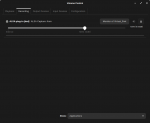fred@DESKTOP-GVLJLM4:~/dsd/dsd$ dsd -a
Digital Speech Decoder 1.7.0-dev (build:v1.6.0-91-gf175834)
mbelib version 1.3.0
ALSA lib confmisc.c:767

parse_card) cannot find card '0'
ALSA lib conf.c:4693

_snd_config_evaluate) function snd_func_card_driver returned error: No such file or directory
ALSA lib confmisc.c:392

snd_func_concat) error evaluating strings
ALSA lib conf.c:4693

_snd_config_evaluate) function snd_func_concat returned error: No such file or directory
ALSA lib confmisc.c:1246

snd_func_refer) error evaluating name
ALSA lib conf.c:4693

_snd_config_evaluate) function snd_func_refer returned error: No such file or directory
ALSA lib conf.c:5181

snd_config_expand) Evaluate error: No such file or directory
ALSA lib pcm.c:2642

snd_pcm_open_noupdate) Unknown PCM sysdefault
ALSA lib confmisc.c:767

parse_card) cannot find card '0'
ALSA lib conf.c:4693

_snd_config_evaluate) function snd_func_card_driver returned error: No such file or directory
ALSA lib confmisc.c:392

snd_func_concat) error evaluating strings
ALSA lib conf.c:4693

_snd_config_evaluate) function snd_func_concat returned error: No such file or directory
ALSA lib confmisc.c:1246

snd_func_refer) error evaluating name
ALSA lib conf.c:4693

_snd_config_evaluate) function snd_func_refer returned error: No such file or directory
ALSA lib conf.c:5181

snd_config_expand) Evaluate error: No such file or directory
ALSA lib pcm.c:2642

snd_pcm_open_noupdate) Unknown PCM sysdefault
ALSA lib pcm.c:2642

snd_pcm_open_noupdate) Unknown PCM cards.pcm.front
ALSA lib pcm.c:2642

snd_pcm_open_noupdate) Unknown PCM cards.pcm.rear
ALSA lib pcm.c:2642

snd_pcm_open_noupdate) Unknown PCM cards.pcm.center_lfe
ALSA lib pcm.c:2642

snd_pcm_open_noupdate) Unknown PCM cards.pcm.side
ALSA lib pcm.c:2642

snd_pcm_open_noupdate) Unknown PCM cards.pcm.surround21
ALSA lib pcm.c:2642

snd_pcm_open_noupdate) Unknown PCM cards.pcm.surround21
ALSA lib pcm.c:2642

snd_pcm_open_noupdate) Unknown PCM cards.pcm.surround40
ALSA lib pcm.c:2642

snd_pcm_open_noupdate) Unknown PCM cards.pcm.surround41
ALSA lib pcm.c:2642

snd_pcm_open_noupdate) Unknown PCM cards.pcm.surround50
ALSA lib pcm.c:2642

snd_pcm_open_noupdate) Unknown PCM cards.pcm.surround51
ALSA lib pcm.c:2642

snd_pcm_open_noupdate) Unknown PCM cards.pcm.surround71
ALSA lib pcm.c:2642

snd_pcm_open_noupdate) Unknown PCM cards.pcm.iec958
ALSA lib pcm.c:2642

snd_pcm_open_noupdate) Unknown PCM cards.pcm.iec958
ALSA lib pcm.c:2642

snd_pcm_open_noupdate) Unknown PCM cards.pcm.iec958
ALSA lib pcm.c:2642

snd_pcm_open_noupdate) Unknown PCM cards.pcm.hdmi
ALSA lib pcm.c:2642

snd_pcm_open_noupdate) Unknown PCM cards.pcm.hdmi
ALSA lib pcm.c:2642

snd_pcm_open_noupdate) Unknown PCM cards.pcm.modem
ALSA lib pcm.c:2642

snd_pcm_open_noupdate) Unknown PCM cards.pcm.modem
ALSA lib pcm.c:2642

snd_pcm_open_noupdate) Unknown PCM cards.pcm.phoneline
ALSA lib pcm.c:2642

snd_pcm_open_noupdate) Unknown PCM cards.pcm.phoneline
ALSA lib confmisc.c:767

parse_card) cannot find card '0'
ALSA lib conf.c:4693

_snd_config_evaluate) function snd_func_card_driver returned error: No such file or directory
ALSA lib confmisc.c:392

snd_func_concat) error evaluating strings
ALSA lib conf.c:4693

_snd_config_evaluate) function snd_func_concat returned error: No such file or directory
ALSA lib confmisc.c:1246

snd_func_refer) error evaluating name
ALSA lib conf.c:4693

_snd_config_evaluate) function snd_func_refer returned error: No such file or directory
ALSA lib conf.c:5181

snd_config_expand) Evaluate error: No such file or directory
ALSA lib pcm.c:2642

snd_pcm_open_noupdate) Unknown PCM default
ALSA lib confmisc.c:767

parse_card) cannot find card '0'
ALSA lib conf.c:4693

_snd_config_evaluate) function snd_func_card_driver returned error: No such file or directory
ALSA lib confmisc.c:392

snd_func_concat) error evaluating strings
ALSA lib conf.c:4693

_snd_config_evaluate) function snd_func_concat returned error: No such file or directory
ALSA lib confmisc.c:1246

snd_func_refer) error evaluating name
ALSA lib conf.c:4693

_snd_config_evaluate) function snd_func_refer returned error: No such file or directory
ALSA lib conf.c:5181

snd_config_expand) Evaluate error: No such file or directory
ALSA lib pcm.c:2642

snd_pcm_open_noupdate) Unknown PCM default
ALSA lib confmisc.c:767

parse_card) cannot find card '0'
ALSA lib conf.c:4693

_snd_config_evaluate) function snd_func_card_driver returned error: No such file or directory
ALSA lib confmisc.c:392

snd_func_concat) error evaluating strings
ALSA lib conf.c:4693

_snd_config_evaluate) function snd_func_concat returned error: No such file or directory
ALSA lib confmisc.c:1246

snd_func_refer) error evaluating name
ALSA lib conf.c:4693

_snd_config_evaluate) function snd_func_refer returned error: No such file or directory
ALSA lib conf.c:5181

snd_config_expand) Evaluate error: No such file or directory
ALSA lib pcm.c:2642

snd_pcm_open_noupdate) Unknown PCM dmix
PortAudio version number = 1246720
PortAudio version text = 'PortAudio V19.6.0-devel, revision 396fe4b6699ae929d3a685b3ef8a7e97396139a4'
Number of devices = 0
---------------------------



